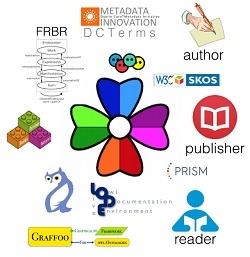SPAR Ontologies to enhance the scholarly articles with annotations about its structural and semantic characterisations
10/01/2018

.jpg)
The Semantic Publishing and Referencing Ontologies : SPAR Ontologies, form a suite of orthogonal and complementary OWL 2 DL ontology modules for the creation of comprehensive machine-readable RDF metadata for every aspect of semantic publishing and referencing:
- document description,
- bibliographic resource identifiers,
- types of citations and related contexts,
- bibliographic references,
- document parts and status,
- agents' roles and contributions,
- bibliometric data and workflow processes.
SPAR Ontologies have been already adopted by different communities and in several projects for describing data related with the publishing domain. Please take a look at the communities uptake page for a complete list of scholarly and industrial works and projects/initiatives citing or using SPAR Ontologies.
|
See, for example : |
The migration of all the SPAR Ontologies from Sourceforge to GitHub has been completed. The new SPAR Ontologies GitHub Organisation includes several repositories, one for each ontology included in SPAR (e.g. https://github.com/sparontologies/cito). This makes easier to post and handle issues and to gather new feedback from the community by using the GitHub issue tracker available in each repository. The old Sourceforge repository will be still available to get the old versions of the various ontologies.
While all the current (and future) ontologies will be available via the http://purl.org/spar and http://purl.org/cerif pURL domains (e.g. http://purl.org/spar/cito), a new https://w3id.org/spar domain as an alternative route for getting to all them (e.g. https://w3id.org/spar/cito) has also been activated. However, even if they are also accessible via the w3id.org service, the IRIs of all the SPAR Ontologies and of all their entities keep the http://purl.org base for backward compatibility reasons (the pURL service is currently maintained by the Internet Archive).
In addition, the content negotiation mechanism of all the SPAR ontologies is now handled outside the SPAR Ontologies website, by means of the w3id.org service (https://github.com/perma-id/w3id.org/blob/master/spar/.htaccess). Thus, in case of some issues in the website (e.g. server crashes), the ontologies will be reachable anyway.
Finally, the new contribution guidelines (https://sparontologies.github.io) allows the community to propose new ontologies to be added within the SPAR suite. Thanks to the new GitHub repository, a clear workflow has been defined for accepting external contribution in a more structured way, compared to what happened in the past.
The FAIR* Reviews ontology (currently at https://w3id.org/fr/def/core) is in the process to be included within the SPAR Ontologies, a very first early adopter of the aforementioned contribution guidelines.
Please follow SPAR Ontologies on Twitter https://twitter.com/sparontologies to get additional updates.
Source:
SPAR Ontologies website - -> SPAR Ontology news
Related:
- VocBench 3 - a free and open source platform for editing ontologies, thesauri and RDF datasets - is now available for download
- Developing Data Interoperability using standards: A Wheat Community use case
- AgroPortal: a backbone for data integration and standardization in Agronomy
- FAIRsharing : Find, Register, Claim your Standard, Database, and Policy... FAIRsharing will do the rest
- Recorded Webinar on Linked Data Competency Index : Mapping the field for Teachers and Learners
- Outputs UDC Seminar 2017 "Faceted Classification Today" (Presentation slides; Posters and poster presentations). The Universal Decimal Classification (UDC) is the world's foremost multilingual classification scheme for all fields of knowledge, a sophisticated indexing and retrieval tool.
